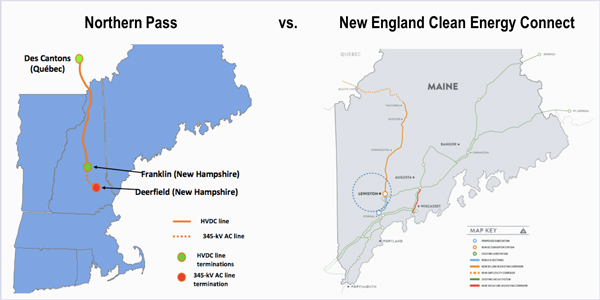By Michael Kuser
Massachusetts on Wednesday revoked its selection of Northern Pass as the sole winner of a massive clean energy solicitation, saying it will instead enter contract negotiations with the rival New England Clean Energy Connect (NECEC) project.
The decision capped a tumultuous two months since the state chose Northern Pass in its MA 83D solicitation for 9.45 TWh per year of hydro and Class I renewables (wind, solar or energy storage). The joint project between Eversource Energy and Hydro-Quebec won the contract Jan. 25, only to see the New Hampshire Site Evaluation Committee (SEC) unanimously reject the 1,090-MW transmission line a week later. (See New Hampshire Rejects Permit for Northern Pass.)
Eversource said it understood why Massachusetts needed to move on with its clean energy plans but that “despite recent delays, we continue to believe that Northern Pass is the best project for the region and New Hampshire, and we intend to pursue all options for making it a reality.”
The company had appealed the New Hampshire decision, but the SEC voted March 12 to wait until its permit denial is published later this month before considering the appeal, effectively killing the 192-mile HVDC line’s chance to meet Massachusetts’ March 27 contract deadline. Any contract awarded under the request for proposals must be submitted to the state’s Department of Public Utilities by April 25.
The Massachusetts committee charged with reviewing proposals selected the NECEC as an alternative to Northern Pass. (See Mass. Picks Avangrid Project as Northern Pass Backup.) The committee consists of representatives from the state’s Department of Energy Resources and distribution utilities Eversource, National Grid and Unitil.
Central Maine Power, an Avangrid subsidiary, partnered with Hydro-Quebec on NECEC, a 145-mile transmission line that would deliver up to 1,200 MW of Canadian hydropower to the New England grid. The partners estimate the project will cost $950 million.
No Free Pass for NECEC
Massachusetts Sierra Club Director Emily Norton on Wednesday lauded the rejection of Northern Pass as “good news,” saying the project “would have increased electricity costs in the state, destroyed pristine wilderness in New Hampshire and continued the destruction of traditional hunting and fishing grounds of First Nations in Quebec, all while failing to reduce climate pollution in the region.”
During a three-day hearing in February, New Hampshire’s SEC voted 7-0 to reject Northern Pass after expressing concerns that it would harm property values, tourism and land use.
Testifying on behalf of the city of Concord, N.H., during the hearing, wetlands scientist Rick Van de Poll said that the project’s temporary and permanent impacts to wetlands in the city would be significantly greater than the developers assumed in their October 2015 wetlands permit application.
Van de Poll said permanent impacts would include reduced habitat fish and aquatic life habitat; loss of habitat for rare and endangered species; and reduced scenic quality, flood storage and groundwater recharge.
But NECEC is not getting a free pass from environmentalists and other industry stakeholders. New Hampshire Sierra Club Director Catherine Corkery joined Norton in saying, “It is too soon to celebrate, however.” NECEC “carries many of the same problems as Northern Pass.”
“MA has gone from the fatally flawed Northern Pass to the nascent NECEC, which doesn’t have any permits,” New England Power Generators Association President Dan Dolan tweeted. “If the original goal was to meet 2020 climate targets, that’s now out the window. All while leading to potentially the largest electric rate increase in state history.”
Three top generators in Maine are already contesting the NECEC. Calpine, Dynegy and Bucksport Generation, which together own one-third of the state’s installed electric generating capacity, have asked the Public Utilities Commission to allow them to intervene late as full parties in the proceeding to review the project. (See Generators Challenge HVDC Line at Maine PUC.)




